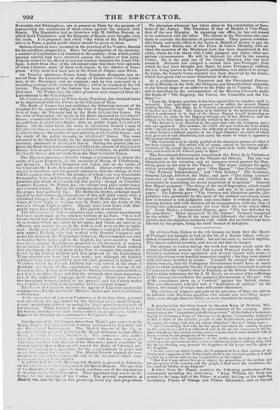Intelligence of the ...eh instant, direct from Madrid, announces Veit
the Queen Itegss • ; nsinted the Cabinet nominated by Espartero and
the Pr',. G1).:,:r:,r;;■•:it, The Madn'el Gazette of the Stir,• ,ry rruf:1. ;•■1-!i.lu:s the Royal ordinance to that effect ; -sana,i Vsnelei e October 3. The ordinance also autho- r: to proceed, in conformity with his own request, to the rest of the Ministers ; and it curleilifIC3 by
stating Q :r,t will regard the Duke of' Vittorizi'm pre-
tense; e.••sse,0 0e eessetee kir the establidiment of peace and ' The Madrid Grizene regards the con- stitution as the cud of the re vollifijir which cow-
left Madrid, to proceed to Valenek,
. ' Co the Queen Regent. The quest ion of ten kees e., , , nee, ,sd, would not form one of the stipulations to Ise prey. --.se •Se is,:tance. That important step With to be de- ferreil ti,1 toe u.eetir.v, of the Cortes. The general impression at Madrid wa.1, that the tz,Aeeri will positively resist any such proposition.
No alteration whatever has taken place in the constitution- or func.- tions of the Juntas. The President of that of Madrid is Vice-Piesl- dent of the new Ministry. In assuming one office, he has not ceased to be connected with the other. The Juntas in the Provinces also con- tinue to exercise the functions of government. They possess consider- able funds, and make offers to the Junta at Madrid of money to pay the troops. Senor Sotelo, one of the Perez de Castro Ministry, who ad- vised the sanction of the Municipal Law, has been imprisoned in cante, where he was taken with a false passport and under other sus- picious circumstances. He will be detained for trial by the ensuing Cortes. Ile is the only one of the Castro Ministry who has been arrested. Arrazola has escaped a second time into Portugal ; from which he had beets brought into Spain by some Portuguese soldiers, but not being known to the Spanish authorities, was allowed to escape. In Cadiz, the Guarda Costa contract has been dissolved by the Junta; which had given rise to some disturbance in that city.
At a conference between Espartero and the Provisional Govern- ment at Madrid, on the 30th, the Delegates put forward certain demand, in the formal shape of an address to the Duke de la Victoria. The re- sult is described by the correspondent of the Morning Chmicle, under the heads of " The Regency, the Cortes, the Camarillo, and the Ca- binet " Upon the Regency question, it has been agreed that its numbers shall he increased. Four individuals are 'proposed to be added, the present Regent making the fifth. The Duke de la Victoria consented with much reluctance to became one of them. The course to be followed in the attainment of this object is understood to be that of the Queen Regent herself demanding an addition to be made to the Regency through one of her 'Ministers, and the subject to be then taken up and finally settled by the new Cortes. " The Senate is to be dissolved at the same time with the Congress, and a new one appointed. This measure, for which the new Cortes are to be called, with special powers,' is to remove the difficulty of having to dissolve twice, in order to have a Liberal majority in the Upper Chamber, one-third of which only goes out at each dissolution, and nearly the whole of which is opposed to the present movement.
" The Camarillo is to be wholly purified of the obnoxious persons of winch it has been composed. The reform will, of course, extend to the tutors and go• vernesses of the young Queen, who are well known to be under foreign influ- ence, and hostile to the Liberal party in Spain."
The Provisional Government entertained the Duke de la Victoria at a banquet on the 2d instant, at the Theatre del Oriente. The city wee illuminated on the occasion, and an immense crowd greeted the illus- trious guest on his way to the Theatre. The toasts indicate the spirit which prevailed: Espartero gave "Our Queen," "Our Constitution," "Our National Independence," and "Our Liberty." His Secretary, General Linage, followed the Duke, and gave " The rising (pronun- ciumento) of the corporation and inhabitants of Madrid, which has terminated in unmasking the secret supporters of despotism." General San Miguel proposed "The rising of the 1st of September, which would form an epoch in the history of Spain, and one of its most glorious pages." Pio Laborde gave " The virtuous and illustrious patriot, (Es- partero,) who, penetrated by the spirit of the national movement, knew how to conduct it with judgment and consolidate it without delay, em-
bracing frankly and with decision all its consequences, with the view of freeing this unfortunate country for ever from the evils which afflict it." Senor Madoz, a Cataloniau Deputy, gave "The law defended by the anarchists! Order preserved by the rioters! Property respected by the rabble !" More of the same kind followed; the virtues of Es- partero and the dignified calmness with which the revolution had been effected by the people, being the chief themes of eulogium.


























 Previous page
Previous page